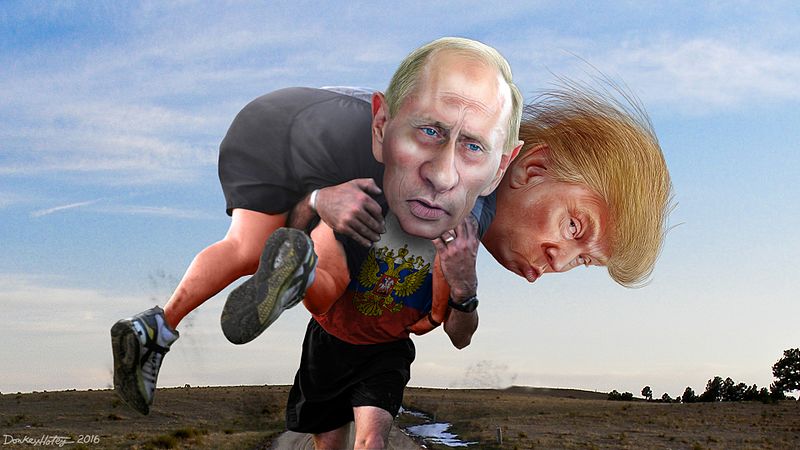President Trump has a well-known habit of accusing others of what he himself is guilty of. For example, he calls Hollywood “racist” and accuses the national media of reporting “fake news.” He calls those who sought to impeach him “corrupt.” Lately, he has taken to accusing his predecessor, Barack Obama, of being guilty of treason.
Could it be then that Trump himself is guilty of treason?
This is a fraught question, all the more so now that Trump and Attorney General William Barr have brought back, and crowed over, the death penalty: after July’s first federal execution in 17 years, Barr said Daniel Lewis Lee “finally faced the justice he deserved.” Under federal law, treason is a capital offense. Are Americans ready to face the dilemma of what to do about an ex-president convicted of it?
But first, the crime, and the evidence.
Conscious of how the British Crown used prosecutions to intimidate and silent dissidents, the framers of the Constitution put up high barriers to conviction as a traitor. The Constitution requires that a citizen must undertake an “overt act” that constitutes “levying war” against the United States or “adhering to their enemies, giving them aid and comfort” to be found guilty of treason.
It is no secret that much of what Trump does is of questionable legality under the Constitution’s emoluments clause and such statutes as the Hatch Act. Many more of his actions are conducted under a cloud of suspicion of improper influence from Russia and other entities. Moreover, his incompetent handling of the pandemic has without doubt caused tens of thousands more Americans to die unnecessarily.
But treason? Set aside the haze and ambiguity of all of the above, and a clear, simple case can be made that this summer’s revelation that Russia paid the Taliban to kill American troops in Afghanistan points directly to it. Why? Because paying to have American troops killed in Afghanistan is levying war against the United States. That’s a grave matter to be handled by the State and Defense Departments. And any American who overtly gives aid and comfort to Russia in levying that war is guilty of treason. That’s an equally grave matter for the Department of Justice.
President Trump has denied he was briefed on Russian support for the targeting of our soldiers, calling stories to the contrary “a hoax.” Despite his protestations, there are solid reports he received a written briefing on the payments in February. Moreover, according to the Associated Press, former national security adviser John Bolton told colleagues he briefed Trump on the payments over a year ago. The C.I.A.’s chief for counterterrorism in south and southwest Asia has written that the president “was most certainly aware of Russian assistance to the Taliban.” Nevertheless, Trump has failed to take any action against or make any statement denouncing Russia for its support of American enemies.
We are left with this question then: if Russia was indeed levying war against the United States and President Trump did know what Russia was up to, did he undertake any “overt acts” that constituted “aid and comfort” to that enemy?
It appears so. On April 25 Trump joined with Russian president Putin in expressing the hope that their two countries “can put aside differences, build trust, and cooperate in pursuit of a greater cause.” On May 7 Trump told Putin he didn’t believe Russia had interfered in the 2016 presidential election. On June 1 Trump spoke to Russian President Putin to invite him to a G7 summit. A few days later Trump ordered the withdrawal of U.S. troops from Germany. A story in the New York Times noted, “The withdrawal of troops will be welcomed in Moscow.” Wouldn’t the withdrawal combined with Trump’s statements give comfort to Russia that there would be no consequences for its actions?
Words can count as overt acts to provide aid and comfort to the enemy. For example, Mildred Gillars, also known as Axis Sally, was found guilty of treason in 1949 for playing a role in a radio play broadcast by Nazi Germany during World War II.
The burden is high on the government to prove such a serious crime. As Chief Justice Marshall held in 1807, “As there is no crime which can more excite and agitate the passions of men than treason, no charge demands more from the tribunal before which it is made a deliberate and temperate inquiry.”
I do wonder whether the next administration—even if it disavows capital punishment—will have the moxie to open an investigation of a former president for treason. A practical argument could be made against such an investigation—it could be cast as the kind of political revenge familiar in third world countries. Still, as Chief Justice Roberts recently wrote, “The President, is ‘of the people’ and subject to the law.” Treason is the only crime spelled out in the Constitution, and, upon taking office, the president swears to “preserve, protect and defend the Constitution of the United States”.
In the meantime, so long as Trump remains president, the country is left with a chief executive who could well be guilty of treason.
Image: Putin carrying his buddy Donald Trump by DonkeyHotey, licensed under CC 2.0
- Perspective: Trump’s Acts May Face America with an Unwelcome Dilemma - September 2, 2020
- Trump: Making America Great (Britain) Again? - September 17, 2019


